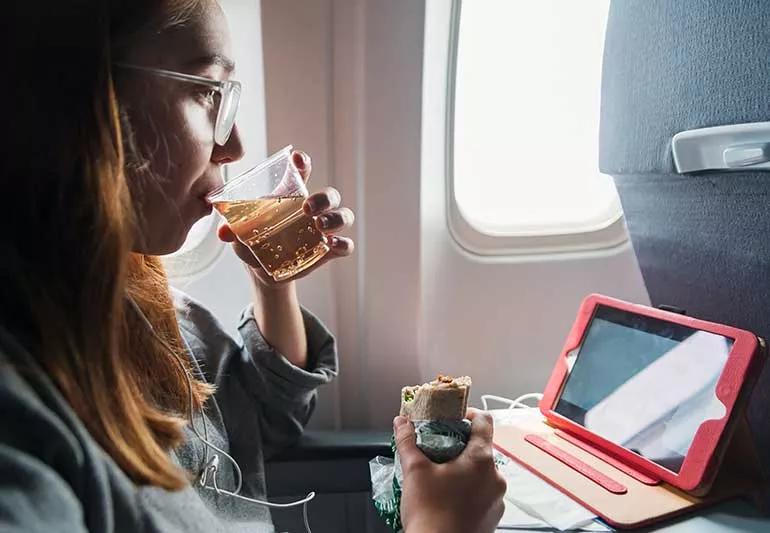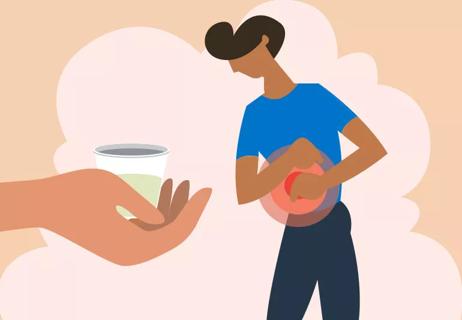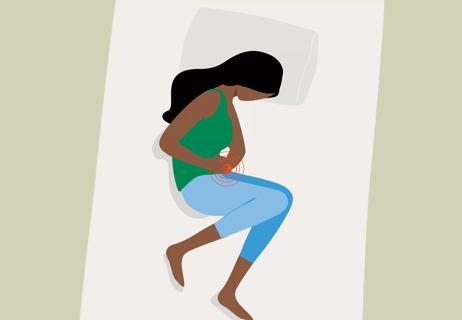From staying hydrated to staying on schedule, these tips can help you stay regular on-the-go

Of course, you had a four-hour layover at JFK and mindlessly ate too much to avoid roaming around the terminal. Thankfully, you slept over much of the Atlantic. But then, you had to run to your gate at Heathrow to make your final connection. Along the way, you feel bloated and no matter how hard you try, you just can’t seem to go to the bathroom.
Advertisement
Cleveland Clinic is a non-profit academic medical center. Advertising on our site helps support our mission. We do not endorse non-Cleveland Clinic products or services. Policy
Whether this is a common recurrence for you whenever you travel, or you’re having on-the-road constipation for the first time, the experience is one that might leave you questioning what’s causing your intestinal blockage and whether you should have ventured so far from home in the first place.
Luckily, constipation while traveling is a common condition that can be prevented and dealt with in equal measure. Gastroenterologist Leyla Maric, MD, explains all the triggers of constipation and shares some helpful tips while traveling.
The reasons behind travel constipation can vary depending on what your body is used to and the trip you’re taking. But according to Dr. Maric, it can be from a combination of changes to your routine, your environment, your stress levels, your diet and more.
“Travel constipation is a very common phenomenon and there are several factors that contribute to it,” she says.
Dehydration plays a big role in constipation because it slows down the movement of waste through your intestines. You can become dehydrated more easily when you experience changes in climate, altitude or your activity levels.
“All of these changes can make stool harder and more difficult to pass,” says Dr. Maric.
Advertisement
“When you’re traveling, you may be consuming different foods than what your body is used to, like eating a diet that’s low in fiber and high in processed foods or consuming excessive amounts of alcohol,” she notes. “These can all contribute to constipation.”
Changes to your diet can also disrupt the balance of beneficial bacteria in your gut microbiome, which plays a role in maintaining healthy digestion.
“This is one of the most common reasons behind travel constipation,” says Dr. Maric. “Travel often disrupts your daily routine, including meal times, sleep patterns, bathroom patterns and your body’s internal clock.”
All of your body’s processes, including digestion, run on a clock — your circadian rhythm. When you sleep, for instance, certain processes, like your digestive system, slow down because you’re not actively eating or drinking. But even when you’re asleep, your digestive system is continually working. That’s why it’s common to have to go to the bathroom first thing when you wake up.
But if your routines get shaken up and you eat at different times, fall asleep earlier or later than you used to, and don’t sleep as often as you’d like or what’s normal for you, you can experience a block in your digestive system.
You can experience another roadblock (pun intended!) if you sit for prolonged periods of time. That goes for road trips, long flights or waiting periods between destinations.
“Regular movement helps stimulate the muscles of your intestines and this promotes healthy bowel movements,” explains Dr. Maric. “When you have a lack of movement, it can slow down the process and lead to constipation.”
We know there’s a deep connection between your gut and your brain. So, when you experience high levels of stress and anxiety, it can have a negative impact on your digestive system.
“A lot of people have a fear of getting constipated without ever really knowing whether or not they will get constipated,” shares Dr. Maric. “Even switching the bathroom that you use ― to one that isn’t your own ― can cause anxiety for some people because it takes them out of their regular routine.”
And when you hold a bowel movement in, it can become suppressed, and then you may start to lose the urge to go, which further worsens constipation.
If you’re used to taking some medications at certain times of the day, your schedule could get thrown off when you find yourself in a new time zone or end up being more lax about your sleep-wake schedule. Such changes in your medication routine could lead to constipation.
Advertisement
“Some medications like antacids or opioids can also further lead to dehydration and constipation patterns,” says Dr. Maric.
You’re more susceptible to constipation if you have:
“People with IBS can be severely constipated or can alternate between diarrhea and constipation,” clarifies Dr. Maric. “IBD is more of a chronic inflammatory issue. People with IBD can have an acute change in their bowel movements simply as a result of changing certain factors like their medications and medical therapy. Those changes can cause a flare-up of symptoms or worsen impaction of stool and cause you to not pass stool as regularly as you should.”
Regularity is different for everyone, but for the most part, it’s common to have a bowel movement every day or every other day. Constipation occurs when your frequency of bowel movements becomes less than what you’re used to. Not having a bowel movement for three or more days is considered constipation.
In most cases, constipation while traveling will go away on its own within a couple of days or when you settle in or return home. If your difficulty with constipation lasts more than a few days and up to a couple of weeks, you should make an appointment with a healthcare provider who can help determine the direct cause and any possible solutions.
Advertisement
“Most people have spontaneous resolution of their symptoms. But it can continue to be a problem for some people and really impact your travel if you’re not able to resume those regular bowel habits on your own,” cautions Dr. Maric. “When we talk about managing constipation, it can be challenging. But there are some preparations and strategies that can help alleviate discomfort.”
This may not completely relieve constipation if you have it, but it can at least soften stools so they’re easier to pass. You may want to push yourself to drink more water than you normally do and double down on eating fruit (which often has high water content) or drinking clear liquids. Avoiding alcohol can also be helpful.
“Drinking water is the most basic thing you can do, especially while you’re flying to a destination or as soon as you arrive at your destination,” encourages Dr. Maric.
Foods high in fiber are an excellent way to stay regular. You don’t have to miss out on trying new foods or completely overhaul your diet to be preventive either. Pack a high-fiber snack while traveling, or try to include fiber in small ways during every meal with:
Advertisement
“Every meal should include at least a serving or two of fruits and vegetables, and it can be really simple and basic,” says Dr. Maric. “As long as you do a good job of keeping fiber on your plate, it’s a simple, natural remedy.”
Vacations are meant to be fun. But if you can, avoid excessive amounts of candy, cheese, pizza, processed foods, chips and ice cream. They can make your constipation worse.
“Granted, it’s sometimes hard to maintain your dietary routine on vacation,” recognizes Dr. Maric. “You may eat on the run a lot more when you’re traveling, but you can try to make conscious decisions about what you’re eating so that you don’t increase your risk for constipation.”
There are a ton of benefits to probiotics. If you’re not entirely devoted to the idea, probiotic-rich foods are a good place to start because they can help regulate your gut microbiome and they’re easy to add to your diet.
“Remedies like yogurt, kefir, fermented foods and probiotic supplements can help with healthy digestion and alleviate symptoms of constipation,” says Dr. Maric.
To keep your digestive system moving, you need to keep your body moving. While this can be hard to work around if you’re stuck on a plane, train or automobile, try your best to move around and stretch as much as you can by scheduling stretching breaks or doing small, seated workouts.
Once you get to your destination, make sure to prioritize any physical activities that you can — and make it fun and a part of your trip!
When you have to go, you have to go. You shouldn’t put off a bathroom break if you can avoid it. And if it helps, make sure you schedule some time throughout the day to make a pitstop.
“Don’t ignore the urge to have a bowel movement and use a public restroom,” advises Dr. Maric. “It might not be ideal for you, but holding it in could worsen your constipation.”
If diet and exercise don’t help your constipation on the trip, don’t be afraid to take a laxative or a stool softener. Just check with your healthcare provider first about which ones you should use, and then use them wisely and only for a short time unless otherwise directed, advised and prescribed by your physician.
“After one dose of a laxative like MiraLAX®, if that doesn’t result in a bowel movement in six to 12 hours, you can take an additional dose,” says Dr. Maric. “Wait until you have a bowel movement, and if you don’t have a bowel movement in 24 hours, you can repeat that dose.”
If you have an underlying chronic condition that contributes to constipation, talk to your healthcare provider before traveling to set up a plan on how to take that medication or if it’s something you can potentially put on hold until you’re back home.
“You can also mix a gentle laxative with warm prune juice, which works very well,” Dr. Maric adds. “It’s easy on the stomach and it’s easy to tolerate.”
Reducing your stress can help your body, and your digestive system, relax. Some ideas to get you on the path to smooth sailing include:
“These are all great things to keep in mind and stay on top of while you’re traveling,” Dr. Maric says.
While it can be easy to stay up late while having fun on vacation, you don’t want to overdo it. Try your best to stick to your sleep routine consistently while traveling. This also goes for your regularly scheduled meal times.
“Try to stay as close to your normal routine as possible,” advises Dr. Maric.
Navigating change isn’t always easy, but don’t give up hope.
“Traveling is a time to watch your diet and other routines more, not less,” says Dr. Maric. “Give your body time to adjust to the new environment.”
And if all else fails and you experience constipation for longer than you’d like or you experience nausea and vomiting in addition to constipation, schedule an appointment with a healthcare provider.
Learn more about our editorial process.
Advertisement

Drinking water, eating high-fiber foods and exercising are just a few of the ways to get back to your ‘regular’ self

It might be, but it’s more likely that your symptoms of constipation and back pain are caused by underlying conditions

Developed in the 1800s, this remedy remains a viable solution today

Prunes earn the title of ‘nature’s remedy’ for bowel movement issues

Stool softeners are a type of laxative that softens your stool, making it easier to poop

A dietitian weighs in on social media’s popular constipation recommendation

Eat foods high in fiber, drink water and consider using a laxative

It could be diet or it could be something else

The tropical fruit is a good source of antioxidants and vitamin C

Most people fall asleep within 10 to 20 minutes, but if your experience is different, adjusting your sleep schedule may help

Exploring your hidden side can lead to better understanding of what makes you tick